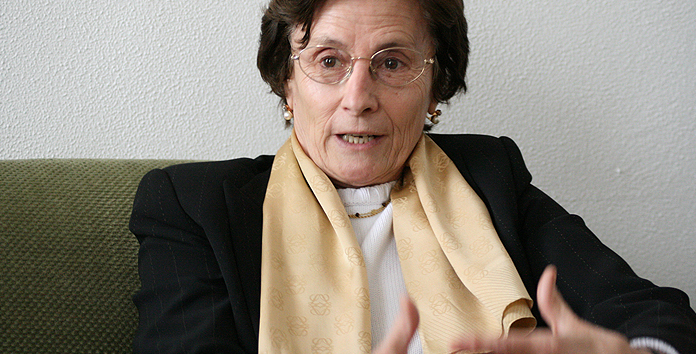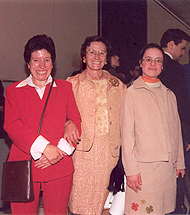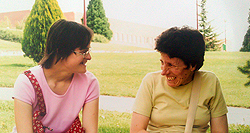"People with disabilities should have their place in all social spheres with the necessary supports."

Mª Victoria Troncoso, who graduated in Law in 1964 from the University of Navarra and later graduated in Therapeutic Pedagogy, is president of the Down Syndrome Foundation of Cantabria since 1982 and promoter of different pedagogical programs of reading and writing for people with disabilities.
Both she and her husband Jesús Florez [Med 61, PhD 64] have played an important role in the world of training and the integration of people with disabilities, and have been recognized with numerous awards for their work in this field. The last of these was the award Telefónica-Fundación Repsol de Familia y Discapacidad last October.
But above all, they are the parents of four children. Their day-to-day life revolves around two of them: Toya and Miriam, aged 49 and 37 respectively. Both have intellectual disabilities, although the anomaly Genetics is different: regular trisomy of chromosome 21, in Miriam; and microdeletion of chromosome 17, in Toya.
Mª Victoria is always looking out for the girls: financial aid, she encourages them and enjoys "their geniality, their sensitivity, their spirit of service, their usual smile and their example of effort and self-improvement". This way in which her daughters live day by day serves as a constant example for her to be more in the present: "Valuing what I have at hand, without suffering for the past and without excessive concern for the future", she explains.
On the occasion of an interview with him in 2002 he said: "We are all equal, because we are human beings, (...), with the same dignity, with rights and duties, with lights and shadows, with weaknesses and strengths, with a mission statement to fulfill". How easy it is to see the weaknesses of others and how difficult it is many times to see our duties and obligations to them!
We need to reflect on the human condition and realize that we are all involved in disability because we are close to it and because it is very likely that we will also become people with disabilities, as we grow older or earlier. It is necessary that in relation to people with disabilities we have more knowledge to act in the best possible way. Knowing more will help us to act better, for the benefit of others and ourselves.
¿How is the day-to-day life of being a mother of a person with a disability?
Caring for my family is a top priority for me. I live with two daughters with intellectual disabilities. Their personalities are very different. They help each other, complement each other in many ways, and love each other very much. They are getting older (and I am getting older!) and that means that my day-to-day life has changed compared to a few years ago, although I am still the "organizer and director".
Both have enough autonomy in their care staff and in the organization of their free time, but they need attention and support in other things: we have to take care of them all day long, from giving them the right medication to help them organize their small budgets and manage their money, to accompany them for walks, to Library Services, to the hairdresser, to the doctor, to watch their per diem expenses and their weight, to share their hobbies, etc. In fact, the eldest is never left alone.
Being a mother of a person with a disability is the best way to stand up for their rights and give voice to their needs so that others will know about them...

Does society know its duties and obligations to these citizens?
Society in general, I am referring to the citizens "on the street", are currently respectful, less surprised or frightened than a few years ago, but still do not recognize that people with disabilities are members of plenary session of the Executive Council right. They are not eternal children to protect, to substitute in their decisions, to marginalize physically or psychologically or to feel uncomfortable when encountering them. We see the disability and do not see the person. Laws establish rights, but the reality is that duties are not fulfilled, sometimes because of ignorance and sometimes because of fear or prejudice.
What shortcomings do you see in our society so that once a child has grown up he/she can be integrated into the labor market?
The first shortcoming is that of knowledge: we ignore the possibilities that people with disabilities have to be competent, effective workers.
Another shortcoming is the lack of an adequate training , which is often a consequence of the previous one: if it is believed that they cannot work, they are not trained for it and therefore cannot work. People with intellectual disabilities do not think about it themselves and sometimes their families do not want it.....
But I also want to emphasize the importance of realism: the work of any person must be appropriate to his or her capabilities. In the case of people with disabilities, it is especially important that it is a real work and that they can perform it effectively. It is not about "a vase" so that the business "looks good" and shows its solidarity, which would be detrimental to everyone. It is a question of his task being necessary and profitable for the business, and that the worker feels useful because he fulfills his functions well. Everyone must be satisfied.
What would be the first step we have to take as citizens for this project integration?
Review our attitudes, since in the face of the unknown we can make wrong judgments. We need to know more in order to act better. It is important that we have an open disposition. In this sense, we had a magnificent experience with an entrepreneur who received us "out of courtesy", but his previous attitude was to tell us "no" because he had an experience of work integration that had been negative. He listened to us, started taking notes and, after an hour of exhibition of our project and exchange of opinions, he said: "We have to try it. It has to go well for the business, for its image." So he hired a young man with Down syndrome. The experience went so well that he kept asking for more workers with Down syndrome... until he had six. If one of them has to leave work for whatever reason, they ask us for another to replace him.
In what aspects should we train ourselves?
We all need to have a basic knowledge of anthropology and psychology to help us understand the similarities and differences of people in general. We all need to learn to value and respect diversity and to understand behaviors and reactions without judging or disqualifying people.
Where to start?

Why do you think the university environment is a good place to reflect on this?
The University has optimal resources to illuminate the intelligences with the truth and thus influence behavior. The different Chairs involved in one way or another in the knowledge of people, have much to transmit so that everyone, and not only those who are going to study a university programs of study , benefit from their teaching, their excellence as an institution, are formed and act accordingly.
If an employer asked you committee to hire a person with a disability, what would you say?
Do not hesitate, do not be afraid, try it, there are already data of "results" beneficial to the business and not only those relating to tax exemptions or social security or image deductions... I could provide you with the testimony of entrepreneurs who have already walked this path and are still on it. But also to be prudent, to be informed of the capabilities of the candidate, of the supports or adaptations that he/she needs including, if applicable, that of a job coach. He will have to assess whether the disability subject is compatible with the possible tasks or functions of his business. You will almost always find the right fit for both parties, and let me know how it works out for you!
